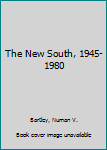The New South, 1945-1980
(Part of the A History of the South (#11) Series and Jules and Frances Landry Award Series)
Select Format
Select Condition 
Book Overview
Almost three decades after publication of the tenth volume of A History of the South - George Brown Tindall's The Emergence of the New South, 1913-1945 - Numan V. Bartley now presents Volume XI: a masterly synthesis of the region's most complex years to date. From the close of World War II to the end of the seventies, the South underwent changes of such a radical nature and such tumultuous process - from rural orientation to urban, from segregated...
Format:Hardcover
Language:English
ISBN:0807120383
ISBN13:9780807120385
Release Date:January 1995
Publisher:Louisiana State University Press
Length:520 Pages
Weight:2.35 lbs.
Dimensions:1.6" x 6.4" x 9.5"
Related Subjects
20th Century Education & Reference History Politics & Social Sciences State & LocalCustomer Reviews
1 rating
Essential reading for understanding the modern South
Published by Thriftbooks.com User , 14 years ago
One of the most significant changes the United States underwent in the decades after the Second World War was what John Edgerton called "the Southernization of America", as many of the dynamics and ideas of the region came to dominate American politics, culture, and society. Because of this, any effort to understand modern American history must include an effort to understand the South during this period. While many authors have written books that have illuminated aspects of the region's history, Numan V. Bartley's book provides a comprehensive examination of the South from the end of the Second World War to the election of Ronald Reagan in 1980, a fitting stopping point for examining the transformations the South itself underwent during that period. Bartley begins by setting the stage for these changes, noting that in 1945 the South was still very much defined by the elements that had shaped its history since the end of the Civil War - a predominantly agricultural economy, a racially stratified society dominated by whites, and a political culture in which a conservative Democratic Party held sway. Yet the undercurrents of change were already being felt. Bartley spotlights in particular the efforts of the CIO-led "Operation Dixie" effort to unionize Southern industrial labor and the Southern Conference of Human Welfare, which attempted to stitch together a political coalition of poor whites and African Americans focused on social justice. Both efforts, however, were crushed by the dominant political and economic establishment, which preferred to hew to their belief that cheap labor and low taxes were the path to stimulating the region's development. This establishment, however, was less successful in resisting the growing demands for civil rights for American Americans that emerged in the 1950s. Bartley see much of the "massive resistance" campaign of Southern whites as little more than a cover for maintaining the segregated and exploitative status quo, one that slowly gave way in the face of civil rights protests and national pressure. Yet he argues that the shift in the depiction of racism from an economic to a moral issue effectively sapped the effort to reform the economic system of the South of whatever remaining momentum it had, as well as causing the South to be singled out as the source fo the racism in American society. The changes brought about by the civil rights movement, Bartley notes, were just one force transforming the South during this period. He also chronicles the emergence of the "Sun Belt" suburban culture during this period, one into which most Southern whites withdrew in the fact of the changes wrought by the civil rights movement. This was paralleled by a cosmetic shift from the Democratic to the Republican parties, as the conservative Southern establishment broke from its increasingly ill-fitting national label for a more ideologically congenial home. In this respect, Ronald Reagan's defeat of Jimmy Carter (a






